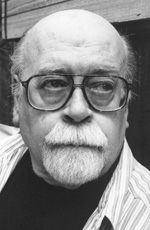Joseph Hansen
Joseph Hansen was awarded the Lambda Literary Award for Gay Mystery in 1991 for A Country of Old Men, and in 1993 he won the Gay Fiction award for Living Upstairs. In 1992 Hansen was awarded the Lifetime Achievement Award from the Private Eye Writers of America.
Also see:
- Hansen’s Obituary published in the Los Angeles Times
- Sept. 2, 2004 Interview with Hansen by C. Todd White
In My Own Words...
by Joseph Hansen
The following profile was submitted to C. Todd White on March 20, 2004
Early Years
I was born in South Dakota in 1923, migrated hungry to Minneapolis in 1933, then, hoping to thaw out, to California in 1936. Almost all my novels and stories are set here. In 1943, I met and married Jane Bancroft, an artist, running a sheet-metal router at Lockheed Aircraft at the time (the war was on). We had a daughter the next year. I had begun writing at age nine, and was still at it but without making it into print until 1952, when The New Yorker began accepting my poems. About the same time, I was singing folk songs on radio as “The Stranger from the Sea.” The two albums that resulted did not exactly make the top forty.
David Brandstetter
It was in 1964 before my first novel was issued, by a little outfit in of all places Fresno, California, the Raisin Capitol of the World. From 1965 to 1970 I helped Don Slater edit a gay literary / political journal we called Tangents. In 1969, John Harris and I founded the Venice Poetry Workshop that is still going strong. Meanwhile, I wrote seven more novels under the name James Colton, for sleaze paperback publishers. Then, in 1970, the great editor Joan Kahn at Harper & Row bravely took on Fadeout, the first David Brandstetter mystery, the fist detective novel ever with a homosexual hero — and I was off an running.
Eleven Brandstetter books followed, along with two mainstream novels, A Smile in his Lifetime (1981) and Job’s Year (1983), and the suspense titles Backtrack (1982) and Steps Going Down (1984). During that same busy decade, I was teaching writing nights at UCLA and at summer writers conferences at Wesleyan University in Connecticut. And it was there, for some reason, that it suddenly came to me that I’d better start novelizing my own life and times before it was too late. The first two Nathan Reed books, Jack of Hearts and Living Upstairs (which won a Lambda award) were published in the early nineties.
Drastic Changes
I had just got a start on a third when I turned up with prostate cancer, Jane had a stroke, an earthquake wrecked our house, and Jane died. All this was unsettling enough that I didn't get back to work right away. But at last I did — a writer is always a writer — first with a memoir of Don Slater, A Few Doors West of Hope, then with stories for the mystery magazines, and at last with The Cutbank Path (Nathan Reed III). The stories make up what I suspect will be my last book, Bohannon’s Women.
I am living at the bottom of the food chain in Laguna Beach, California, struggling to breathe, writing when I can, and trying to hang onto the belief that a movie is about to be filmed of one of my books, thus certifying to Americans everywhere that I really am a writer.
